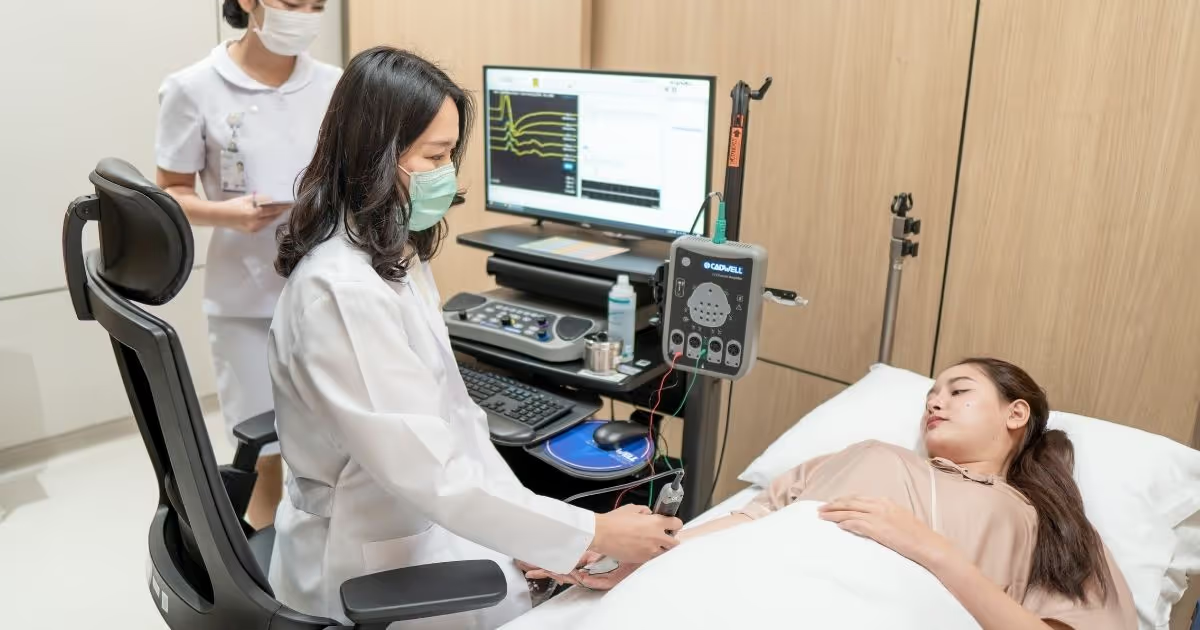Electrodiagnostic Testing
Electrodiagnostic testing is a diagnostic modality for patients with nerve system disorders and muscle weakness. It is not a treatment but a diagnostic study to evaluate the severity of symptoms, to predict a probable course of disease or outcome and to assess treatment response.
Electrodiagnostic testing can provide additional information (Extend) absent from patient’s medical history and physical exam. This test is usually administered by an experienced neurologist for accurate diagnosis and interpretation.
Advantages of Electrodiagnostic Testing
- To diagnose symptoms such as numbness or muscle weakness and locate the damage of peripheral nerves. In case 2 or more lesions or affected nerves in different areas are found, doctors can perform a more thorough examination.
- To identify the cause of disease
- To identify the severity and duration of symptoms
- To plan appropriate treatments
- To locate muscle site for botulinum toxin (Botox) treatment
Electrodiagnostic testing is usually prescribed to patients with the following nerve disorders:
- Peripheral nerve disorder: Patients feel the numbness and tingling sensation. Some may suffer muscle weakness.
- Carpal tunnel syndrome and cubital tunnel syndrome
- Polyneuropathy
- Mononeuritis multiplex
- Myopathy: Patients experience muscle pain or weakness.
- Inflammatory myopathy and necrotizing myopathy
- Hereditary myopathy
- Motor neuron disease (MND): Patients experience muscle atrophy or weakness.
- Neuromuscular junction disorders: Patients suffer from droopy eyelids, swallow difficulties and muscle weakness.
- Muscle pain, numbness, muscle cramps, spasm and abnormal muscle twitching
- Traumatic or injury affecting nerves and muscles
Types of Electrodiagnostic Testing
- Nerve Conduction Study
This involves electrical stimulation. Patients can feel a mild electrical impulse move through muscles and stimulated muscles will contract. This type of testing can diagnose both sensory and motor nerve function. - Electromyography
This test can measure muscle response with the use of needles. Patients may experience slight pain if the needles are repositioned. Patients will be asked to contract muscles or change the position during the test.
Before performing testing above, a neurologist will determine which part of the patient’s body such as hand, arm, leg should be examined. In some cases, both left and right side of body parts will be tested. This depends on each patient’s symptoms, physical condition and medical problems. The result will be interpreted by a neurologist. It usually takes around 30 minutes to 2 hours. - Other tests
- Repetitive nerve stimulation
- Quantitative sensory testing is to determine sensation of hot/cold, pain and vibration.
- Autonomic testing is to diagnose the patient with dizziness, lightheadedness after reposition, autonomic failure caused by diabetes or nervous system disorders.
- Evoked potentials involve the use of light and sound to assess the function of peripheral and central nervous system.
Electrodiagnosis is a detailed and complex test. Prior to the procedure, a physical history and examination should be performed. The finding will be evaluated along with the result of electrodiagnosis. This test is helpful for diagnosis of peripheral nerve disorders in order to devise a suitable treatment plan and accurate prognosis.
Article by
Dr Manasawan Santananukarn
Neurologist, Clinical Neuromuscular and Electrodiagnostic Study
Doctor profile




